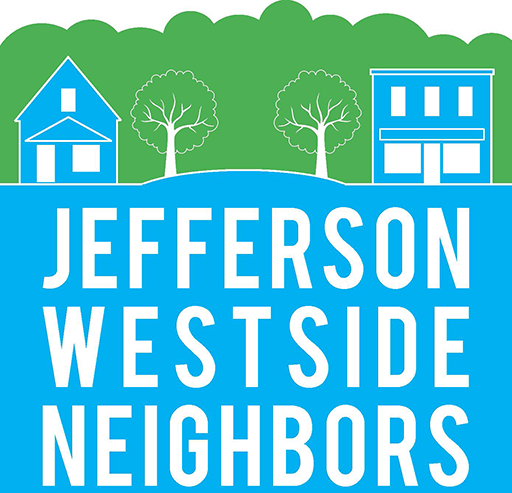CHARTER Family-Friendly Housing Refinement Plan Amendment Project Project Team
This plan is for discussion and vote at the May 11 General Meeting. Visit the Naval Reserve Site Housing Project for background and details.
Jefferson Westside Neighbors
Executive Summary for the
CHARTER
Family-Friendly Housing Refinement Plan Amendment Project
Project Team
There is an opportunity to develop the former Naval Reserve Site into affordable family-friendly housing, which requires amendments to the Jefferson/Far West Refinement Plan*. Enclosed is a Charter document, which serves as a roadmap for assembling a Project Team and providing guidance for how that team will identify and propose needed amendment changes. The Charter has been prepared by the Jefferson Westside Neighbors (JWN) Board; the execution of the tasks within the Charter, however, will rest in the hands of numerous volunteer representatives from the immediate area surrounding the former Naval Reserve Site. The Project Team will be responsible for developing a Project Plan, including developing a timeline, identifying necessary tasks, and providing opportunities for community members to learn about and provide input on proposed changes.
What does this mean to you and why are you receiving this Charter? JWN neighbors are being asked to review the enclosed Charter draft, which will be discussed in the upcoming neighborhood meeting on Tuesday, April 13, 2021. Membership will then be asked to approve the proposed Charter at the next scheduled neighborhood meeting on Tuesday, May 11, 2021. Approval is required for the JWN Board to move forward with assembling the team of volunteers who will conduct the work. This Charter is just the beginning of the process; JWN neighbors will have ample opportunities to provide input and ask questions of the Project Team as well as the JWN Board.
How is the enclosed Charter structured? What are key sections within the document? Project Charters provide the purpose, scope, and organizational structure, including enabling the JWN Board to recruit a team of volunteers who will prepare the Project Plan. A Charter isn’t a Project Plan; a Charter merely defines the structure of the Project Team, who will ultimately be responsible for developing the plan.
Section III is necessary for City officials and staff to understand which existing policies this project is based on. The Project Team should review the enumerated policies, but the policies are less specific than the project Charter.
Section V describes the Project’s final work products that will be presented to the JWN Board. The JWN Board will then present the results for review, discussion, and ultimately a vote by the JWN General Membership. If approved, the JWN Chair will present the work products to the City Council and City Manager and request that the City Council initiate the formal, legal land use process to adopt the recommended amendments. That land use process is not explicitly part of this project because Eugene’s Land Use Code defines the required steps. If the refinement plan amendments are ultimately adopted by the City Council, the old Naval Reserve site will be available for, and restricted to, development as affordable, intergenerational, family-friendly housing.
Section VII specifies the composition and function of the Project Team. It’s very important to understand that the Project Team is not meant to serve as a “representative, decision-making” body. This means that team members do not vote as individuals representing some particular constituency or their own personal opinions. The team’s responsibility is to ensure that the work products they deliver are an evidence-based, equitable synthesis of well-informed JWN members’ opinions. That means the Team’s specific efforts are to ensure JWN members have ample opportunities to learn about the issues and provide informed input to the process. That requires drawing on available resources, including knowledgeable individuals, to understand the many facets of the form of proposed housing, the proposed site and surrounding residents, property owners, businesses, local schools, including parents with children attending the schools, and other organizations.
The remaining Charter sections provide a high-level framework for how the Project Team is formed and what basic structure will be required for the team to conduct the work. These provisions don’t dive into details––that will be the Project Team’s responsibility to develop. An overarching element of the Charter is that the JWN Board has a clear role and responsibility to see that the Project Team operates effectively in engaging the community. The Board can direct the Project Team at any time the Board feels it is necessary. That, in turn, enables JWN members to raise issues and concerns with the Board or even to adopt a motion(s) directing the Board to take specific actions with respect to the conduct of the project.
*The Jefferson/Far West Refinement Plan is a document previously developed in collaboration with neighborhood leadership, City of Eugene staff, and other area stakeholders to provide a framework for renewal, enhancement, and redevelopment of the Jefferson Area Neighborhood and northern portion of the Far West Neighborhood. For detailed information on the existing plan, please visit: https://www.eugene-or.gov/DocumentCenter/View/41511/Jefferson-Far-West-Refinement-Plan.
Full Detailed Draft
CHARTER
Family-Friendly Housing Refinement Plan Amendment Project
Project Team
